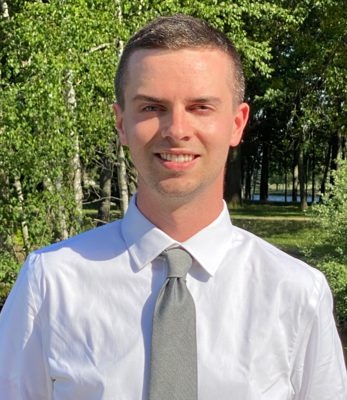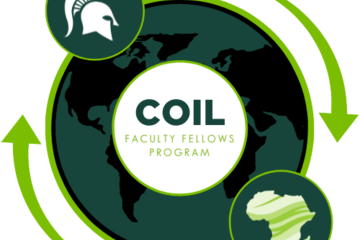
Justin Rabineau
(Michigan State University)
Program Manager
Alliance for African Partnership
Capacity Building
Climate Change
Conservation
Education
Equity
Linguistics
Partnership
Policy
Renewable Energy
Sustainability
Harnessing Africa's Bounty: Promoting Indigenous and Traditional Crops for Sustainable Food Systems
Recording on May 15th, 2024 as part of AAP Public Dialogue Series
By:
Justin Rabineau
Monday, Jan 27, 2025
AGRI-FOOD SYSTEMS
Leave a comment
Harnessing Artificial Intelligence for Transformative Education in Africa
Recorded on Nov 20th, 2024 as part of AAP Public Dialogue Series
By:
Justin Rabineau
Monday, Jan 27, 2025
SCIENCE, TECHNOLOGY AND INNOVATION
Leave a comment
Announcement of Selected Teams: 2nd Cohort of COIL Faculty Fellows Program-Africa
MSU’s Global Youth Advancement Network (GYAN), Alliance for African Partnership (AAP), and Office for Education Abroad are pleased to announce the selected teams for the second cohort of the COIL Faculty Fellows Program-Africa. Sponsored by AAP, this online fellowship program is an opportunity for teaching faculty from any discipline to explore the theory and practice of Collaborative Online International Learning (COIL) through global partnerships connecting institutions within the AAP Consortium.
Approximately 45 highly esteemed teaching faculty expressed interest in partaking in our fellowship program and the selection committee was so impressed by the quality of all team applications received that seven teams were selected, rather than six teams as initially planned. In this second cohort of our fellowship program, MSU fellows representing the Broad College of Business, College of Agriculture & Natural Resources, College of Arts & Letters, College of Education, College of Engineering, and College of Osteopathic Medicine will collaborate with African fellows from Kenya, Nigeria, and South Africa.
Join us in congratulating and welcoming the seven teams below:
Antoinette Tessmer, Broad College of Business (Finance Dept.), Michigan State University.
Jade Verbeek, Faculty of Economic and Management Sciences (Dept. of Marketing Management), University of Pretoria (South Africa).
Christina Dokter, College of Osteopathic Medicine (Dept. of Pharmacology & Toxicology), Michigan State University.
Ngozi Chioma Okoronkwo, Faculty of Agriculture (Dept. of Food Science and Technology), University of Nigeria Nsukka (Nigeria).
Daniel Uyeh, College of Agriculture and Natural Resources & College of Engineering (Dept. of Biosystems & Agricultural Engineering), Michigan State University.
Ifeoma Quinette Anugwa, Faculty of Agriculture (Dept. of Agricultural Extension), University of Nigeria Nsukka (Nigeria).
Ilce Gabriela Medina Meza, College of Agriculture and Natural Resources & College of Engineering (Dept. of Biosystems & Agricultural Engineering), Michigan State University.
Oluchukwu Margaret Mary Nwadi, Faculty of Agriculture (Dept. of Food Science and Technology), University of Nigeria Nsukka (Nigeria).
Thomas Rimer, Broad College of Business (Finance Dept.), Michigan State University.
Chukwudi Kingsley Onyeachu, Institute of Social Policy, University of Nigeria Nsukka (Nigeria).
Trixie G. Smith, College of Arts and Letters (Dept. of Writing, Rhetoric, and Cultures), Michigan State University.
Folake Ruth Aluko, Faculty of Education (Unit for Distance Education), University of Pretoria (South Africa).
Vaughn W. M. Watson, College of Education (Dept. Teacher Education), Michigan State University.
Everlyn Oluoch-Suleh, School of Humanities and Social Sciences (Dept. of Languages and Literature), United States International University-Africa (Kenya).
Our most sincere thanks to all applicants and to those who helped share this opportunity within their networks. Stay tuned to GYAN's COIL webpage for future events or new Calls for Fellows.
By:
Justin Rabineau
Tuesday, Jul 30, 2024
EDUCATION

Leave a comment
Essential Competencies of Frontline Agricultural Extension Professionals
This training manual was funded by Michigan State University through the Alliance for African
Partnership (AAP) for the 2021 Partnerships for Innovative Research in Africa (PIRA) grant award
at the scaling grant funding level titled ‘Strengthening Agricultural Extension Training in the MSU Alliance for African Partnership (AAP) Consortium Partners in Africa’.
By:
Justin Rabineau
Monday, Apr 15, 2024
AGRI-FOOD SYSTEMS

Leave a comment
AAP Connect Issue 1 - Editor's Note
Editor's Note:
Greetings to our esteemed AAP Consortium members and stakeholders,
It is with immense pleasure and a sense of collective achievement that I introduce the first issue of AAP Connect - a beacon of our concerted efforts in fostering visibility, communication, and engagement across AAP and all stakeholders and partners. Born out of the pivotal Consortium meeting in Abuja, this newsletter is a testament to our shared vision and commitment to elevating AAP’s strategic goals and activities to new heights.
The recent revision of the 2023 AAP Strategic Plan, enthusiastically endorsed by AAP’s consortium member leadership and Advisory Board, marks a significant milestone in our journey and reflects a profound trust and belief in our renewed vision.
Among the noteworthy updates to our strategy is the introduction of Goal 6, emphasizing documentation, learning, and knowledge exchange. This is not merely an addition but a critical pivot towards enhancing our capacity for effective communication, engagement, and collaborative learning. It is a move that promises to strengthen our bonds and elevate our collective impact on research and innovation for Africa.
As we launch this inaugural issue, our focus is on underscoring the importance of building bridges and networks. These networks are not just conduits for sharing information but are the very fabric that supports and propels research and innovation tailored to African needs and contexts.
We are thrilled to share with you the updates and milestones within our consortium, showcasing the dynamic and impactful work being done across our network. This is more than a newsletter; it is a call to action, a platform for engagement, and a testament to the power of unity in driving sustainable development across Africa.
Thank you for being an integral part of this journey. We look forward to continuing to work hand in hand, building on the solid foundation we have laid to realize transformative research and partnership in Africa.
Warm regards,
Amy JamisonEditor, AAP Connect
AAP Co-Director
By:
Justin Rabineau
Friday, Apr 5, 2024
OTHER
Leave a comment
Africa-US-Asia Business Partnership Forum Unveils New Horizons in Agri-Entrepreneurship
Africa-US-Asia Business Partnership Forum Unveils New Horizons in Agri-Entrepreneurship
The Africa-US-Asia Business Partnership Forum (the Forum) has emerged as a transformative and groundbreaking platform, fostering an innovative collaboration between South African, US, and Japanese academic experts and agri-entrepreneurs. This transregional partnership aims to redefine capacity strengthening for entrepreneurs and new collaborative business ventures by focusing on the shared developmental trajectories of Africa, US, and Asia, moving beyond the traditional North American and European frameworks. This partnership, funded through Partnerships for Innovative Research in Africa (PIRA), also brings diverse knowledge systems and approaches to knowledge creation and entrepreneurship, the type of partnership needed in to solve complex or “wicked” problems.
Innovative Approach to Learning and Collaboration
The project was inspired by "translative adaptive" literature, highlighting the parallel developmental paths of Africa and Asia. It leverages the concept of "translocal" learning, where iterative spaces empower individuals from diverse geographical and cultural contexts to exchange ideas and perspectives. This approach facilitated joint fieldwork in South Africa and Japan, enabling entrepreneurs and stakeholders to address sustainability challenges collaboratively.
Insights and Collective Learning
A significant achievement of the Forum has been the empirical validation of the "translocal" learning concept within the business management and entrepreneurship domains. The project showcased how South African and Japanese agri-entrepreneurs, despite their distinct socio-cultural backgrounds, converged on sustainability as a common concern. This collective learning process has paved the way for potential joint ventures aimed at tackling sustainability issues in their respective regions. Unexpectedly, the project revealed that despite initial differences, the entrepreneurs found common ground in their sustainability goals. This stemmed from continuous mutual learning and highlighted the project's capacity to bridge seemingly disparate business cultures and priorities.
Lessons in Transregional Partnerships
This collaboration, enriched by diverse expertise in fields like supply chain management, entrepreneurship, and sustainability, was crucial in driving the project forward. It underscored the importance of patience, respect, and openness in transregional collaborations, acknowledging the challenges posed by different time zones, work schedules, and responsibilities. These values have been instrumental in managing expectations, sharing responsibilities, and equitable fund distribution.
Looking Ahead: Expanding the Partnership
With plans to extend the Forum's reach beyond the initial countries, discussions with the African Development Bank are underway to secure funding for the next phase. This expansion aims to broaden the impact and include more beneficiaries The Forum has set the stage for future sustainable business ventures that transcend geographical and cultural boundaries.
AAP’s Impact
Participants have lauded AAP for its role in supporting the partnership, and to its commitment to the transformative potential of innovative transcontinental partnerships in fostering sustainable development and entrepreneurship.
By:
Justin Rabineau
Friday, Apr 5, 2024
AGRI-FOOD SYSTEMS
+1

Leave a comment